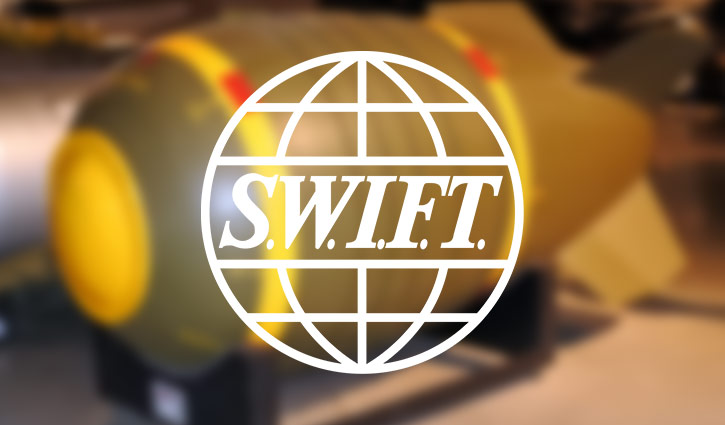Will the use of ‘financial nuclear weapon’ weaken Russia?
BI Desk || BusinessInsider

Photo: Representational
The United States, United Kingdom, Europe and Canada on Saturday decided to exclude some Russian banks from the SWIFT, an international payment system, as part of its move to weaken Moscow as it continues its aggression in Ukraine.
The Society for Worldwide Interbank Financial Telecommunication (SWIFT), which is an international network for thousands of banks worldwide, is used to facilitate money transactions quickly and faultlessly.
Analysts said this is the strongest economic sanction the western countries have so far imposed against Russia for its invasion of Ukraine.
Ukraine has been urging Western nations to exclude Russia from the payments system and it was backed by countries such as Britain and Canada. Others, such as Germany, was worried about the possible impact on their economies and companies for the ban. Later, on Saturday Germany shifted its position and said it was looking for a way to kick off Russia from SWIFT.
After the SWIFT measures were unveiled overnight, Japan was initially the only G7 country that had not signed on to the move.
However, late on Sunday, Japan’s Prime Minister Fumio Kishida said it will join the SWIFT ban on Russia.
French Finance Minister Bruno Le Maire said on Friday that the SWIFT ban is a ‘financial nuclear weapon’ and its use must be very thoughtful.
“When you have a nuclear weapon in your hands, you think before using it,” he told reporters.
Impact of removal from SWIFT will depend on targeted banks:
Russian banks that will be excluded from SWIFT will find it harder to communicate with their counterparts globally. Even trade with friendly countries, such as China, will slow and make transactions costlier.
The foremost impact will be on the Russian’s central bank as its capacity to support the ruble will be very limited. But that will depend on which Russian banks will be removed from the SWIFT, analysts said.
“The devil will be in the details,” said Edward Fishman, an expert on economic sanctions at the Eurasia Center of the Atlantic Council think tank. “Let’s see which banks they select,” Fishman tweets.
If the list covered the largest Russian banks, such as Sberbank, VTB, and Gazprombank, it would be “an absolutely huge deal,” he said.
“It really is a dagger into the heart of Russian banks,” said Kim Manchester, whose firm provides financial intelligence training programs to institutions.
Manchester said the US had been selective in its sanctions, leaving room to tighten further by blocking more banks and eventually imposing a blanket ban. “It is a creeping barrage.”
Devastating blow
The western allies expect the impact is to be devastating for the Russian economy and markets.
When markets open on Monday, the sanctions are likely to hit the ruble hard said Sergey Aleksashenko, a former deputy chairman of the Russian central bank who now lives in the US.
“This will ruin a significant part of the economy,” Aleksashenko added. “Half the consumer market is going to disappear. These goods will disappear if payments can’t be made for them.”
However, the economy can cushion the blow if the listed banks are limited to those already sanctioned and Russia’s central bank was given time to transfer assets elsewhere, said one former senior Russian banker.
“If it is the banks that are already sanctioned, it doesn’t really make a difference. But if it is in the top 30 Russian banks then that is an entirely different matter,” he said.
“It all sounds very loud and everyone is very glad, but in reality, it is a political statement.”
Previously announced US sanctions against a handful of Russian banks including Sberbank and VTB, took direct aim at the vast majority of about $46 billion worth of daily foreign exchange transactions by Russian financial institutions. Those sanctions targeted nearly 80 percent of all banking assets in Russia.
As an alternative to SWIFT, Russia has set up its own network, the System for Transfer of Financial Messages (SPFS).
It sent about 2 million messages in 2020, or about a fifth of Russian internal traffic, says the central bank, which aims to up this share to 30 percent in 2023.
But SPFS, which limits the size of messages and operates only on weekdays, has found it hard to add foreign members.
























